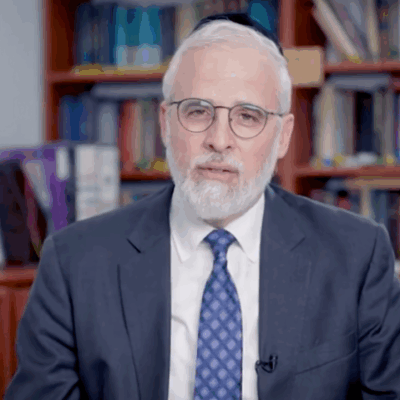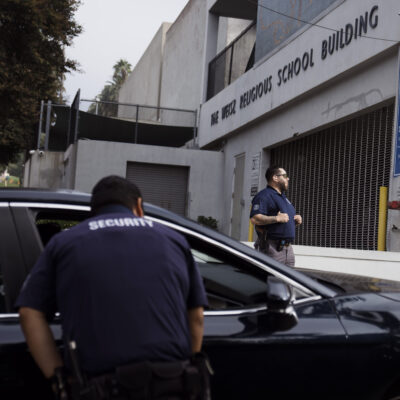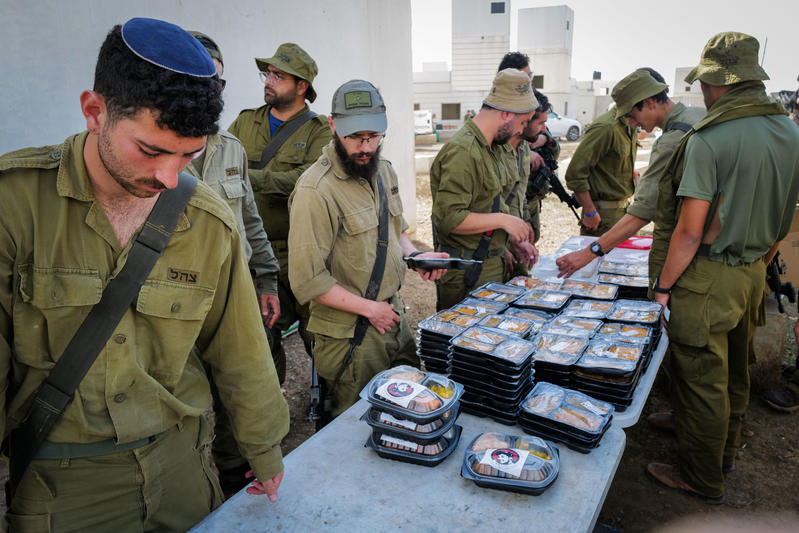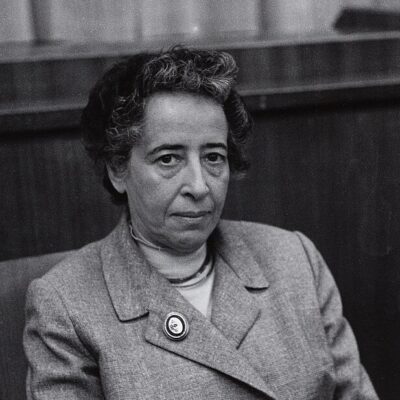THE WAR AT HOME
Israel’s conflict in Gaza may be winding down, but for reservist families, the battle continues
With spouses and parents away for long stretches over the past two years, many Israeli families are struggling financially and emotionally, and the state resources are often insufficient, experts say
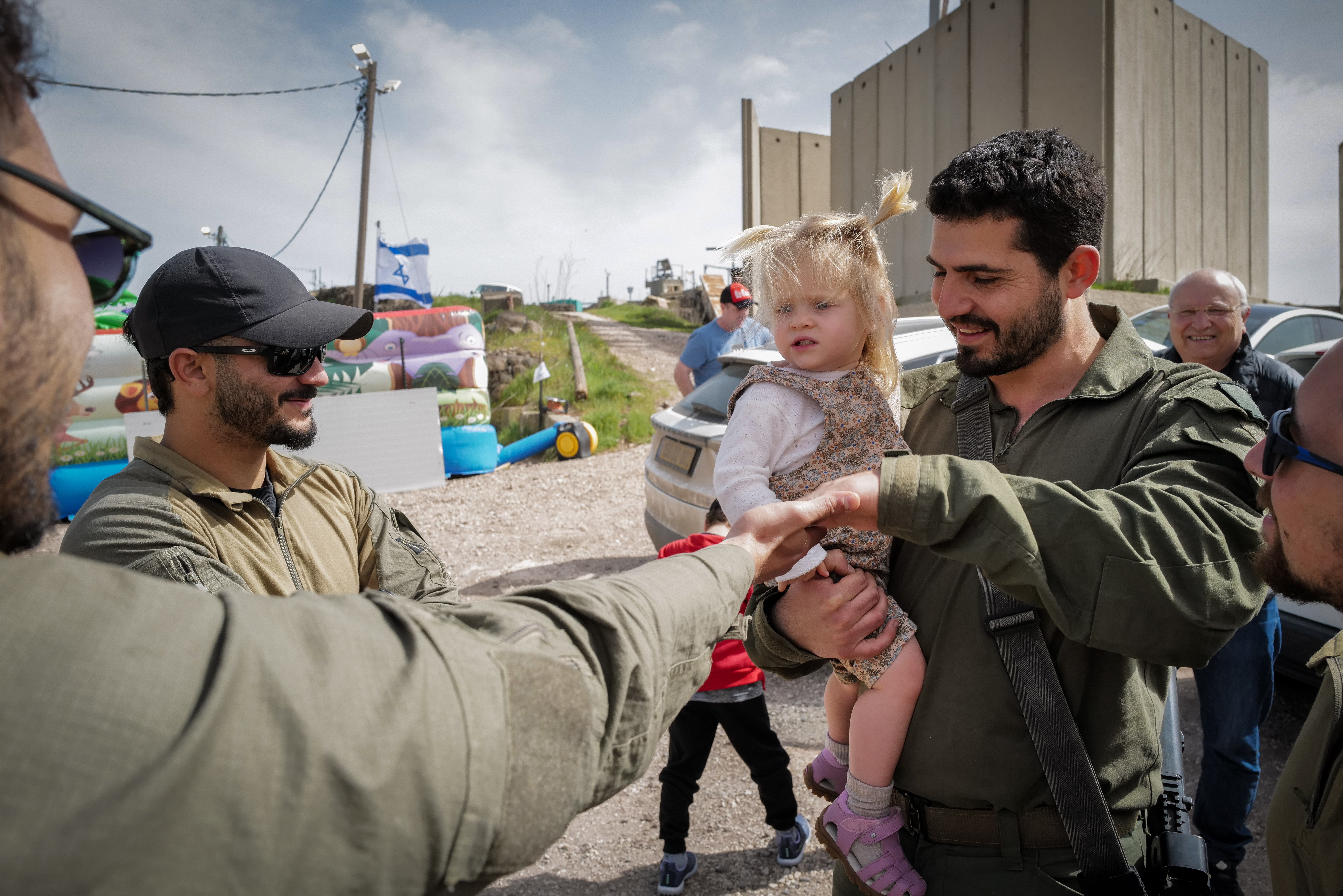
Michael Giladi/Flash90
Israeli reserve soldiers meet with family members during an appreciation event on an army base in northern Israel, on Jan. 29, 2024.
Every morning, Neta Vizel wakes up and thanks her husband, Eldad, a reserve tank commander in the Israel Defense Forces, for being home. “I thank him for being here, someone I can rest my head on, someone I can share the household duties with.”
It’s a ritual born of struggle, following two years of her husband’s lengthy absences for reserve duty in Gaza and fear for his safety. For Vizel, a global organizational consultant and a military psychologist in the reserves, life changed dramatically on the morning of Oct. 7, 2023, when Eldad was called up. For the next two years, with no relatives nearby to help with the household, Vizel trained her children to take on responsibilities at home.
Help from the military, unfortunately, fell short. “The army offers families things like a night at a hotel at a reduced price,” she said. “But at the end of the day, what we needed most was for someone to come to my house and help me fold laundry. And that never happened.”
As Israel’s longest-running war in recent history appears to wind down, the toll on reservist families is far from abating. And despite the current ceasefire, the IDF has announced plans to significantly increase the amount of mandatory reserve duty per year going forward, to double or triple prewar levels.
Israel’s military policy has long been based on a reserve model, with a relatively small number of active-duty troops for day-to-day operations that can be joined by a far larger number of reservists as needed. Indeed, after the Oct. 7 attacks, the IDF called up more than 300,000 reservists — several times the size of the standing army — which was one of the largest mobilizations in the country’s history.
But ordinarily, this model only pulls in large numbers of reservists for a few weeks, not two years, leaving tens of thousands of families struggling with a crisis that NGOs and the government are still scrambling to address. And as Rachel Azaria, founder of HaOgen for Reservist Families, is careful to point out, even the current armistice is not a sure thing. “It’s a ceasefire. It’s not peace accords. Even in the best-case scenario, reservists will continue serving for months to come,” Azaria said.
Of the hundreds of thousands of reservists called up since Oct. 7, 2023, approximately 118,000 are parents with children at home. Many of these reservists have served multiple stints, totaling an average of 136 days per year.
Most of the children affected by these prolonged absences are young — preschool and elementary school age. “How do you explain to a 6-month-old baby that her father is going away for a few months?” Azaria asked.
HaOgen partnered with Herzliya’s Reichman University to create a program teaching parents how to build resilience in toddlers, with thousands of families participating over two years. “If these kids don’t finish school properly, if they’re having too many problems, it’s going to continue with them for years,” Azaria said. “These are very important years in their lives.”
Reservists also represent the backbone of Israel’s economy — doctors, lawyers and high-tech professionals, most of them in their prime working years, from their mid-20s to their late 40s.
“These are the most important families for Israeli society, they’re holding the economy,” Azaria said. “Without major political changes — such as ultra-Orthodox citizens joining the military and sharing the burden — the pressure falls disproportionately on this same population of professionals and taxpayers. If we don’t take care of them, our economy will be in trouble,” she warned. A March 2025 survey by Israel’s Employment Service found that most reservists are facing financial strains, with 41% saying they had lost or left their jobs because of their service and half describing the economic toll as “significant” (compared to 27% who said they could manage to cope).
Azaria founded HaOgen immediately after the Oct. 7 attacks, basing it on a similar initiative she launched during the 2014 Gaza war. “No one thought the war would last so long,” she said.
Now, nearly two years later, her organization helps support 35,000 families through a network of 20,000 volunteers across over 800 cities and towns throughout Israel. This includes hands-on help with babysitting, meals, errands, as well as communal events. For this work, the organization received Israel’s 2025 Presidential Volunteer Award.
But that help doesn’t necessarily reach everyone. Sharon Cohen-Karp, a clinical social worker who treats reservists who have served more than 100 days through the Welfare Ministry’s Youth and Children Division and Sderot’s resilience center, has seen the isolation many of their wives feel. “In the beginning, there was major mobilization among Israeli civilians to support the families,” she said. “Now that it’s been two years, people forget they are still there.”
“In many ways, the wives have been through a more difficult time than the men,” said Lavi Zamir, CEO of Bshvil Hamachar (“Path for Tomorrow,” in English), a nonprofit that helps IDF combat reservists process battlefield trauma and reintegrate into civilian life through nature-based group retreats. “We’ve got each other, we’ve got our camaraderie, while they need to pick up kids from school, go to work, leave early, come home late and live with the knowledge that someone can die,” Zamir said.
For reservists, straddling the war and home life can be challenging. It’s what Zamir calls the “war-life balance.” “We need to balance our life in the war and still remember that we are part of a family and to be a good husband and a good father,” he said.
“There are different kinds of miluimnikim [reservists],” Azaria said. “Some can make the transformation — they manage to hold on to their two selves — their self as a warrior and their self as whatever they are in regular life: a lawyer, a father, a husband. They can do it together.”
But for others, especially those who served for extended periods, the transition can prove far more difficult. “For instance, in the army, you give commands. Your mind learns how to process short messages,” Azaria said. “Then you come home, and you have a 3-year-old who can’t finish a sentence.” Some soldiers, she said, sleep on the floor when they first return because they can’t adjust to a bed after months of sleeping in combat conditions.
“When the family connects again, it’s not like you’re coming and restarting the computer,” Zamir said. “You need some time, and you need some tools to understand how to get back to being a family again.”
The mental health toll runs deep. Cohen-Karp reported seeing dozens of suicide cases among reservists. “Reservists don’t receive enough treatment for themselves and their families,” she said. The state provides NIS 1,500 (approximately $450) in total for therapy to all reservists — funding that quickly runs out after a handful of sessions with a psychologist or couples counselor.
As a military psychologist, Vizel said she sees another disturbing pattern: a growing number of separations and divorces. “At some point after a year, the wife understands that she can handle the family and household on her own,” she said.
Azaria is blunt about the scope of the problem: “There are not enough therapists in Israel to deal with everything that has to be dealt with.” This is why HaOgen focuses on building community resilience. “When you’re part of a community, when you feel that you’re not alone and when you feel that you’re part of something bigger, that’s what builds resilience,” she said.
Nonprofits like Path for Tomorrow provide emotional and psychological support to male and female reservists. Zamir, a lieutenant colonel who served 400 days as a deputy commander of the IDF’s Nahal Brigade and a veteran of many Israeli wars, personally understands the toll that reserve duty exacts on families. His organization, which runs healing retreats for reservists, has begun offering programs for parents and spouses.
Zamir stressed the need for far greater state intervention to address the challenges that reservists and their families are facing. “It’s not my job to chase after funding for these programs. It’s the Israeli government’s job to give me the funding. My job should be to carry out the programs,” he said.
For the Vizels and families like them, the path to healing involves getting back to the basics. “We are hankering to return to routine. Boring routine,” Vizel said. “None of us is 100%. It’s an entire nation that needs to be rehabilitated.”
Cohen-Karp agreed but remains hopeful. “In Sderot, I am seeing that children are really resilient and strong. I feel good about their abilities,” she said.
Azaria too believes in Israeli society’s ability to cope with hardship. “We are an amazing nation,” she said. “It’s hard to comprehend how people are willing to volunteer for such a long time and to be there for people they don’t know.”

 Add EJP on Google
Add EJP on Google